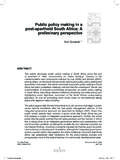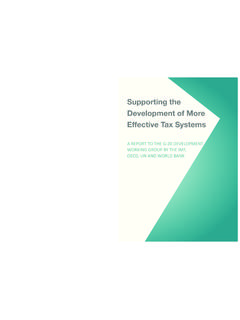Transcription of Public policy making in a post-apartheid South Africa: A ...
1 Public policy making in a post-apartheid South Africa: A. preliminary perspective Vusi Gumede1 2. ABSTRACT. This article discusses Public policy making in South Africa since the end of apartheid in 1994, concentrating on nation building'. Contrary to the characterisation and conclusions reached by Luiz (2002) and Wenzel (2007), among others, on the South African Public service and Public policy making and associated outcomes', this article concludes that Public policy making in South Africa has been undertaken relatively well and that the consequent results' are commendable. It presents a preliminary perspective on Public policy making in South Africa, describing relevant institutions (including non-state actors) and highlighting some high-level outcomes' of the South African policy - making approach, as well as presenting some broad views on developments taking place with regard to nation building.
2 The article argues that, first at a theoretical level, the obvious next stage in Public sector reforms worldwide, after the new Public management reforms, is the integrated governance approach (as described by Halligan 2007). Given how Public sector reforms have evolved, it would seem that South Africa has just truly entered a phase of integrated governance approach. Further, the article posits that the Public policies that are being pursued and the manner in which this is being done (in an integrated governance fashion and partnerships with rest of society) constitute an attempt to mediate the neo-classical economic (or neo-liberal) thinking, including constraints imposed by theories (such as Public choice theory) on development.
3 In addition, although the integrated governance'. system requires further interrogation, the article tentatively concludes that South Africa has established ideal institutions for the policy - making process and encapsulates most of the salient features of a democratic developmental state. Unisa Press Africanus 38 (2) 2008. ISSN: 0304-615X pp 7-23. 7. Africanus-1 7 2008/11/15 07:02:17 PM. Vusi Gumede Keywords: social policy , South Africa, nation building, Public policy making , developmental state, integrated governance, social cohesion, institutional mechanisms 1 INTRODUCTION. This article discusses Public policy making in South Africa since the end of apartheid in 1994.
4 It concentrates on nation building'. Given that nation building is an important aspect of social policy , the perspective presented here is premised on Mkandawire's (2001). definition of social policy as collective interventions directly affecting transformation in social welfare, social institutions and social relations'. It would seem that this is the most comprehensive and persuasive definition of social policy , although there is still no consensus on this The premise of this article is influenced by views of scholars such as Adesina (2007). who, in his review of African social policy experiences, concluded that most social- policy - making initiatives in Africa were influenced by the nationalist' agenda of nation building and (economic) growth.
5 Also, the view that the role played or not played by the state is critical for development or lack of it influences the approach this article takes,4. especially since it is posited that the South African government has been relatively hands-on in both policy making and implementation or rather that the configuration of government since 1998 or so has lent itself readily to an active developmental state. The notion that politics, as Bahl and Linn (1994) argue in the case of central-local governance relations', is one of the most critical factors that determine the nature of governance arrangements is also attractive. Leftwich (1995) also emphasises the role of politics in the context of developmental states.
6 This view could be extended to argue that political dynamics significantly, at least intuitively, impacts on Public policy or rather that it would inevitably have some role. After all, the agenda of the Public sector is set largely by politicians or influenced by a political discourse and more so by the political manifesto of the party that wins the elections (in democratic states). In fact, Dror (2006:81) alludes to this when he argues that policy and politics closely interact, often overlap, and in part cannot be separated even analytically'. Other scholars such as Stone (2001) and Persson and Tabellini (2000, 2006) have dealt with this issue, in different contexts.
7 2 SCOPE OF THE ARTICLE. To place the discussion in a proper context, it is important to first have a common understanding of concepts such as Public policy , human development, nation building, developmental state and state capacity/capability because of their evident relevance. As Howlett and Ramesh (2003) put it, there are many competing definitions of Public policy . Enough has been written about definitions of Public Most of this literature draws from seminal work of the pioneers of policy science', such as Lasswell6 and from the earlier work of For the purpose of this article, Public policy is defined broadly as all formal and publicly known decisions of governments that come about through pre-determined channels in a particular administration.
8 Properties of this 8. Africanus-1 8 2008/11/15 07:02:17 PM. Public policy making in a post-apartheid South Africa: A preliminary perspective definition would readily lend themselves to scrutiny but, given limited space and time, this article cannot unpack those. Moran, Rein and Goodin (2006) view Public policy as the business end of political science, where theory meets practice in the pursuit of the Public good'. Human development, as argued by others, is seen to be associated with people, rather than physical goods and services, as the real wealth of a nation. It is said that the human development paradigm categorises a country as developed only if its people are free and possess choices and entitlements.
9 The concept of human development entails enlarging people's choices in a society. Amartya Sen (1999) is used here in trying to describe human development, which relates to enhancing and expanding human capabilities. Human capabilities, as Sen puts it, refer to a set of valued things that it is feasible for a person to do from dependable access to adequate nourishment to having the possibility of being a respected participant in community life'. With regard to the notion of a developmental state, many scholars associate this with the state that, in partnership with non-state actors, vigorously pursues developmental objectives, though in many instances the focus is largely on economic development.
10 For instance, Bagchi (2000: 398) defines a developmental state as a state that puts economic development as the top priority of governmental policy and is able to design effective instruments to promote such a goal'. Drawing from various scholars in the field, the following definition is proposed: a developmental state is a state that is active in pursuing its developmental agenda, working with social partners, and has the capacity and is appropriately organised for its predetermined developmental definition of the World Development Report (1997) that state capacity/capability is the ability of the state to undertake collective actions at least costs to society' seems widely accepted and is used in this article.





